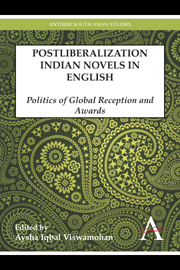Book contents
- Frontmatter
- Dedication
- Contents
- Acknowledgements
- Foreword
- Introduction
- 1 A Maverick Scholar: The Writings of Pankaj Mishra
- 2 Commodification of Post-Rushdie Indian Novels in English: Kunal Basu and the Politics of Decanonization
- 3 Marketing Lad Lit, Creating Bestsellers: The Importance of Being Chetan Bhagat
- 4 Vikas Swarup: Writing India in Global Time
- 5 The God of Small Things: Arundhati Roy's ‘Made in India’ Bookerboiler
- 6 Aravind Adiga: The White Elephant? Postliberalization, the Politics of Reception and the Globalization of Literary Prizes
- 7 ‘The Multinational's Song’: The Global Reception of M. G. Vassanji
- 8 ‘Shreds of Indianness’: Identity and Representation in Manju Kapur's The Immigrant
- 9 Inside ‘The Temple of Modern Desire’: Recollecting and Relocating Bombay
- 10 Tabish Khair: Marketing Compulsions and Artistic Integrity
- 11 Rohinton Mistry and the Canlit Imperative
- 12 Amitav Ghosh: The Indian Architect of a Postnational Utopia
- 13 Here, There and Everywhere: Vikram Seth's Multiple Literary Constituencies
- 14 Whatever Happened to Kaavya Viswanathan?
- 15 Of Win and Loss: Kiran Desai's Global Storytelling
- 16 Immigrant Desires: Narratives of the Indian Diaspora by Chitra Banerjee Divakaruni
- Glossary of Indian Words
- List of Contributors
- Bibliography
- Index
3 - Marketing Lad Lit, Creating Bestsellers: The Importance of Being Chetan Bhagat
Published online by Cambridge University Press: 05 July 2013
- Frontmatter
- Dedication
- Contents
- Acknowledgements
- Foreword
- Introduction
- 1 A Maverick Scholar: The Writings of Pankaj Mishra
- 2 Commodification of Post-Rushdie Indian Novels in English: Kunal Basu and the Politics of Decanonization
- 3 Marketing Lad Lit, Creating Bestsellers: The Importance of Being Chetan Bhagat
- 4 Vikas Swarup: Writing India in Global Time
- 5 The God of Small Things: Arundhati Roy's ‘Made in India’ Bookerboiler
- 6 Aravind Adiga: The White Elephant? Postliberalization, the Politics of Reception and the Globalization of Literary Prizes
- 7 ‘The Multinational's Song’: The Global Reception of M. G. Vassanji
- 8 ‘Shreds of Indianness’: Identity and Representation in Manju Kapur's The Immigrant
- 9 Inside ‘The Temple of Modern Desire’: Recollecting and Relocating Bombay
- 10 Tabish Khair: Marketing Compulsions and Artistic Integrity
- 11 Rohinton Mistry and the Canlit Imperative
- 12 Amitav Ghosh: The Indian Architect of a Postnational Utopia
- 13 Here, There and Everywhere: Vikram Seth's Multiple Literary Constituencies
- 14 Whatever Happened to Kaavya Viswanathan?
- 15 Of Win and Loss: Kiran Desai's Global Storytelling
- 16 Immigrant Desires: Narratives of the Indian Diaspora by Chitra Banerjee Divakaruni
- Glossary of Indian Words
- List of Contributors
- Bibliography
- Index
Summary
if chick lit is popular fiction by, for and about young women (or ‘tweens’), then lad lit can be explained as a fictional genre with books written by men and focusing on twentysomething male characters, particularly about those who are self-absorbed, nonconformist and afraid of commitment. While some critics may object to the general candy floss nature of the genre, what remains unchallenged is its enormous popularity among target readers, occasionally resulting in successful films. Notable examples include Bridget Jones's Diary (1996), Sex and the City (1997), The Devil Wears Prada (2003) and, to an extent, He's Just Not That Into You (2004) – all produced by big Hollywood studios, featuring major box office stars. Quite similar in tone are the ‘guy's books’: Nick Hornby being the accepted big daddy of the genre, along with Matt Dunn, Michael Weinreb, Michael Chabon and Eric Jerome Dickey (and to some degree Toby Young and Aaron karo's selected works). Some common themes that readers of this category are familiar with include masculine insecurities, competition at college or the work place, sexual fantasies, drug addiction, relationships, heartbreaks, family issues and obsession with sports. Like chick lit, lad lit too has a cult following, and some of the notable screen adaptations are High Fidelity (2000), How to Lose Friends and Alienate People (2008), About a Boy (2002) and Wonder Boys (2000), featuring A-list names such as Michael Douglas, Toby Maguire, Hugh Grant and John Cusack, in roles reinforcing the belief that ‘boys will be boys’.
- Type
- Chapter
- Information
- Postliberalization Indian Novels in EnglishPolitics of Global Reception and Awards, pp. 19 - 30Publisher: Anthem PressPrint publication year: 2013

